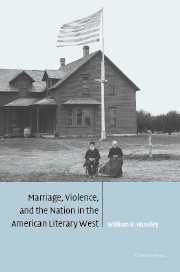Book contents
- Frontmatter
- Contents
- List of illustrations
- Acknowledgments
- Introduction
- 1 Western unions
- 2 Turner's rhetorical frontier
- 3 Marrying for race and nation: Wister's omniscience and omissions
- 4 Polygamy and empire: Grey's distinctions
- 5 Unwedded West: Cather's divides
- 6 Accident and destiny: Fitzgerald's fantastic geography
- 7 Promises and betrayals: Joan Didion and Wallace Stegner
- Afterword
- Notes
- Index
7 - Promises and betrayals: Joan Didion and Wallace Stegner
Published online by Cambridge University Press: 22 September 2009
- Frontmatter
- Contents
- List of illustrations
- Acknowledgments
- Introduction
- 1 Western unions
- 2 Turner's rhetorical frontier
- 3 Marrying for race and nation: Wister's omniscience and omissions
- 4 Polygamy and empire: Grey's distinctions
- 5 Unwedded West: Cather's divides
- 6 Accident and destiny: Fitzgerald's fantastic geography
- 7 Promises and betrayals: Joan Didion and Wallace Stegner
- Afterword
- Notes
- Index
Summary
Writing during the sexual revolution of the 1960s, Joan Didion and Wallace Stegner bring this study to an appropriate close, to the transitional moment when the dissatisfactions over female options in the gendered West have reached breaking point, and when the battle between the sexes begins to be decoupled from nationalist narratives of western significance in much of the region's literature. What begins to flourish more broadly in this period is not only the representation of female autonomy and non-white subjectivity, but a thoroughgoing critique of the ongoing rhetoric that makes marriage the structuring principle in symbolic nation-building. The work of Didion and Stegner demonstrates that the impulse to find a usable western past can produce some surprisingly destabilizing results. The ambiguous relationship between past and present in their work unsettles any critical attempts to make the past conform to an ideological or mythic standard that can be used either to reflect or to construct the critic's present. In their refusal to predict the future they resemble Turner and reflect a pessimistic reading of Turnerian western significance. But Turner believed in a teleology of the frontier promise that transcended the particularities of those individuals who experienced settlement, the spiritual meaning of which they were not aware. In contrast, the nonprogressive meaning of the frontier for Didion and Stegner, who see a continuing trail of broken promises that connects the past with the present, extends only as far as the imagined lives of their particular characters do.
- Type
- Chapter
- Information
- Marriage, Violence and the Nation in the American Literary West , pp. 191 - 223Publisher: Cambridge University PressPrint publication year: 2002

